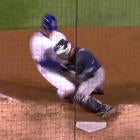During the course of an eventual 3-2 Cubs win in Wrigley Field on Monday night, Padres center fielder Matt Szczur kept the lead intact against his former teammates with an excellent throw home to cut down the would-be tying run in Anthony Rizzo.
The play was something we don't see very often at all any more, because the Cubs first baseman bowled over catcher Austin Hedges:
Hedges would leave the game with a bruised thigh. The Padres seemed pretty angry after the game about this play, specifically seen in comments from manager Andy Green.
Andy Green called the home plate collision "fairly egregious" and a "cheap shot." Questioned why his catcher wasn't protected.
— Dennis Lin (@sdutdennislin) June 20, 2017
He did clarify he doesn't think Rizzo is dirty, but that the play wasn't acceptable:
Green made it clear he doesn't think Rizzo is a dirty player. But he understandably thinks his (franchise) catcher should be protected.
— AJ Cassavell (@AJCassavell) June 20, 2017
This wouldn't have been a discussion a handful of years ago, but the rules regarding collisions at home plate have since been tightened. It was getting a bit out of hand, with players seemingly chasing catchers down the line to bowl them over. MLB instituted Rule 7.13 as a result.
Right off the bat, let's dispel this myth that collisions are banned. They aren't. The rule was just given some shark-strong teeth as to when a player is allowed to clean the catcher's clock.
Here is the main portion of the rule. I'll bold the parts that seem to apply most here:
(1) A runner attempting to score may not deviate from his direct pathway to the plate in order to initiate contact with the catcher (or other player covering home plate), or otherwise initiate an avoidable collision. If, in the judgment of the umpire, a runner attempting to score initiates contact with the catcher (or other player covering home plate) in such a manner, the umpire shall declare the runner out (regardless of whether the player covering home plate maintains possession of the ball). In such circumstances, the umpire shall call the ball dead, and all other base runners shall return to the last base touched at the time of the collision. If the runner slides into the plate in an appropriate manner, he shall not be adjudged to have violated Rule 6.01(i)(Rule 7.13).
There is an attached comment in the rules that says if a catcher blocks a player's path to home plate, the umpire should rule the contact was unavoidable.
So the question here is whether or not Rizzo went straight toward home plate as well as if Hedges gave him a path to home plate without fully blocking it.
On the first part, from this angle, it doesn't appear to me that Rizzo badly deviates from his path home. He's still running generally toward home plate. I'm not sure it's overly conclusive one way or the other.
The second part is the point of discussion and argument where it should become more clear.
Was Hedges fully blocking the plate when Rizzo had to decide whether or not to slide or plow into him?
It's as simple as that. Pick a side on that one and you'll have your answer.
Well, unless you are to claim Rizzo is a dirty player. He made a snap judgement and has no history of doing anything like this. If he made the wrong decision during a split-second on Monday, it was just that: A wrong decision. Many will think he made the correct one, though. It'll be interesting to see how the conversation unfolds on this one.


















